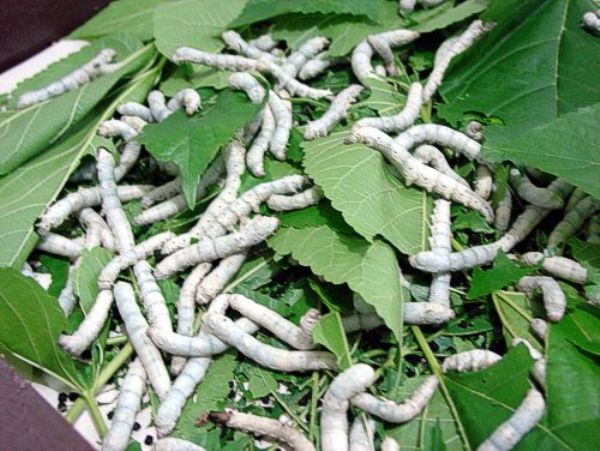
Silk Worms
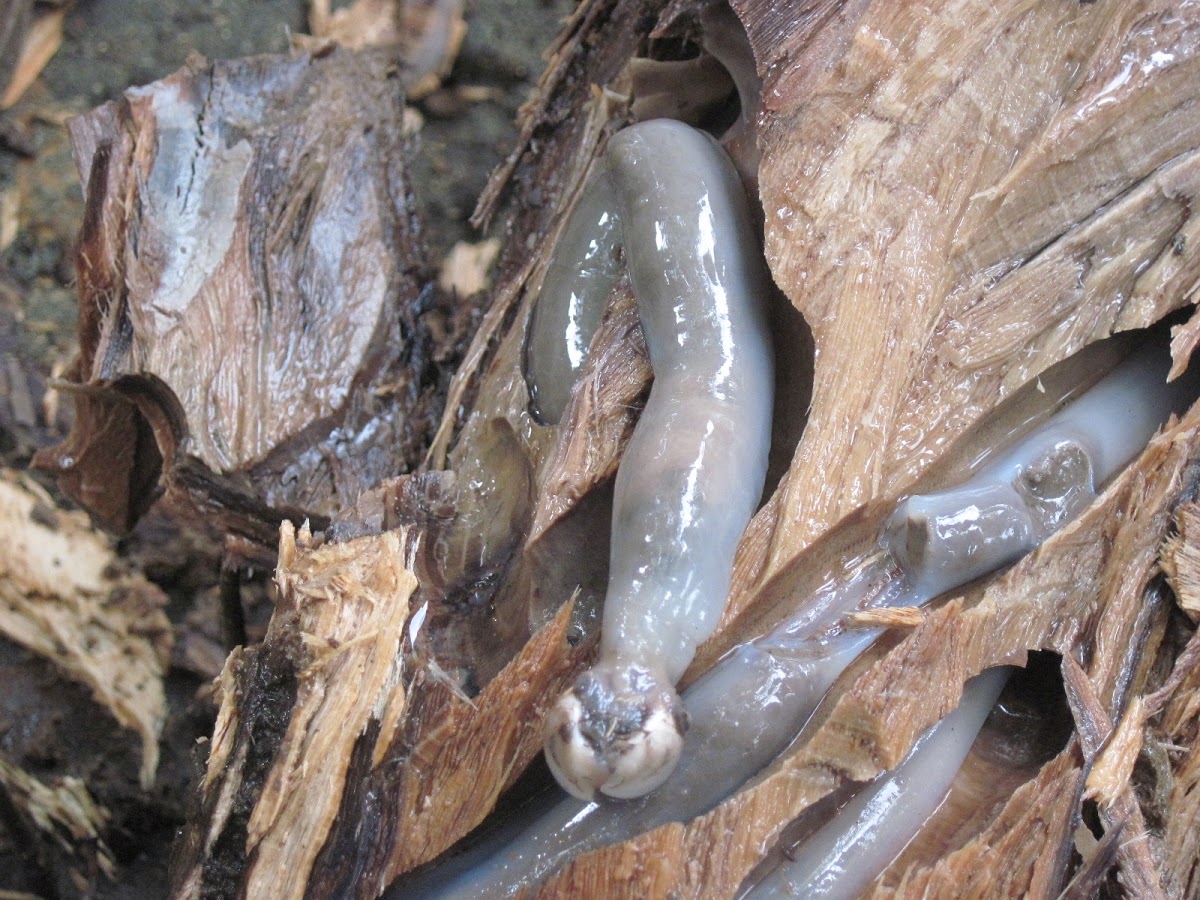
Teredo Worms
FAITHFUL IN LITTLE THINGS.
"Tars," said Deacon Hays, "is probably the last ship I shall ever build, and I intend to have her as perfect as possible."
So he selected a beautiful model, and, knowing that the owner wanted something very superior, he spared no time or money in procuring the best timber to be had, and the best workmen to be found; and then he watched over every stick as it was hewn and fitted in its place, every plank that was spiked on the timbers, and every spar that was prepared. When they came to put the copper sheathing over the bottom of the ship, the deacon watched it very closely. At one spot he found that the head of a copper nail which fastened the sheathing was split. The deacon's eyes were be-coming rather poor, but he saw the broken head.
"Jim Spiker, I see a nail broken; isn't there a little hole by its side!"
"Not a bit of it, I'm sartin. There couldn't a drop of water get in-there in a century."
So the word of Jim was accepted, the ship was finished and launched, and made two or three prosperous voyages. During one of these she lay at a wharf in Calcutta. Now, these waters swarm with that little pest, the ship-worm. They crawled all over the ship, but could not get through the copper sheathing. At length Mrs. Teredo lit upon the broken nail, found the little hole, and squeezed her-self in. Then she began to eat the timber and lay her eggs in it. Soon they hatched and increased, till that timber was full of little teredoes, and then the next and the next, till every stick in the whole ship was very badly worm-eaten. Still, the ship looked sound, sailed well, and made her long voyage.
At length, when in the middle of the great ocean, a terrible storm met her. The wind howled through the rigging as if singing a funeral dirge.
The waves rolled up and writhed as if in agony.
Every spar was bent, and every timber and spike strained to the utmost. The cargo, which filled the ship was of immense value. The crew was large and the passengers were many. Worse and worse grew the storm, till at last a huge wave struck her with all its power. The poor ship staggered, groaned once, and crumpled up like a piece of paper. She foundered at sea, in the dark night, in that awful storm. The rich cargo all went to the bottom of the ocean. The drowned men and women sank down, down, miles before they rested on the bottom. All done through the neglect of Jim Spiker, who was too unfaithful to mend the hole made by the broken nail.
—My Paper
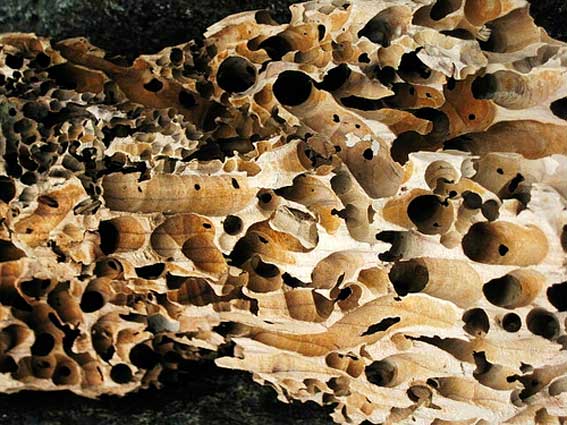
Teredo
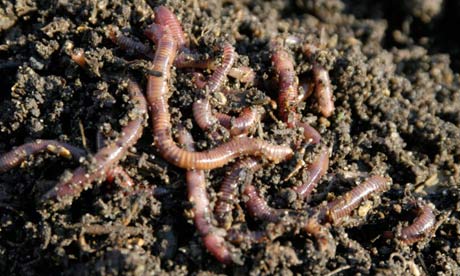

Eaten By Worms
Herod, not long after Peter's deliverance from prison, went down from Judea to Caesarea, and there abode. He there made a grand festival, designed to excite the admiration and applause of the people. Pleasure-lovers from all quarters were assembled together, and there was much feasting and wine-drinking. Herod made a most gorgeous appearance before the people. He was clad in a robe, sparkling with silver and gold, that caught the rays of the sun in its glittering folds, and dazzled the eyes of the beholders. With great pomp and ceremony he stood before the multitude, and addressed them in an eloquent oration.
The majesty of his appearance, and the power of his well-chosen language, swayed the assembly with a mighty influence. Their senses were already perverted by feasting and wine; they were dazzled by his glittering decorations, and charmed by his grand deportment and eloquent words; and, wild with enthusiasm, they showered upon him adulation, and proclaimed him a god, declaring that mortal man could not present such an appearance, or command such startling eloquence of language. They farther declared that they had ever respected him as a ruler, but from henceforth they should worship him as a god.
These people had refused to acknowledge Christ, whose coarse and often travel-stained garments were worn over a heart of divine love, rich with that inward adorning, a meek and gentle spirit. Their eyes, blinded by sin, refused to see, beneath that humble exterior, the Lord of life and glory, though his mercy and divine power were revealed before them in works that no man could do. But they were ready to bow down and worship, as a god, the haughty king, whose splendid garments of silver and gold were worn over a corrupt and cruel heart. They did not attempt to penetrate his vain display, and read the depravity and deceit of his character, and the wickedness of his daily life.
Herod knew that he deserved none of this praise and homage; yet he did not rebuke the idolatry of the people, but accepted it as his due. The glow of gratified pride was on his countenance as he heard the shout ascend: It is the voice of a god, and not of man! The same voices which now glorified a vile sinner, had, but a few years before, raised the frenzied cry of, Away with Jesus! Crucify him, crucify him! Herod received this flattery and homage with great pleasure, and his heart bounded with triumph; but suddenly a swift and terrible change came over him. His countenance became pallid as death, and distorted with agony; great drops of sweat started from his pores. He stood a moment as if transfixed with pain and terror, then, turning his blanched and livid face to his horror-stricken friends, he cried in hollow, despairing tones, He whom you have exalted as a god is struck with death!
He was borne in a state of the most excruciating anguish from the scene of wicked revelry, the mirth, and pomp, and display of which he now loathed in his soul. A moment before, he had been the proud recipient of the praise and worship of that vast throng--now he felt himself in the hands of a Ruler mightier than himself. Remorse seized him; he remembered his cruel command to slay the innocent James; he remembered his relentless persecution of the followers of Christ, and his design to put to death the apostle Peter, whom God had delivered out of his hand; he remembered how, in his mortification and disappointed rage, he had wreaked his unreasoning revenge upon the keepers of the prisoner, and executed them without mercy. He felt that God, who had rescued the apostle from death, was now dealing with him, the relentless persecutor. He found no relief from pain of body or anguish of mind, and he expected none. Herod was acquainted with the law of God, which says, "Thou shalt have no other gods before me," and he knew that in accepting the worship of the people he had filled up the measure of his iniquity, and had brought upon him the just wrath of God.
The same angel who had left the royal courts of Heaven to rescue Peter from the power of his persecutor, had been the messenger of wrath and judgment to Herod. The angel smote Peter to arouse him from slumber; but it was with a different stroke that he smote the wicked king, bringing mortal disease upon him. God poured contempt upon Herod's pride, and his person, which he had exhibited decked in shining apparel before the admiring gaze of the people, was eaten by worms, and putrefied while yet alive. Herod died in great agony of mind and body, under the retributive justice of God.
This demonstration of divine judgment had a mighty influence upon the people. While the apostle of Christ had been miraculously delivered from prison and death, his persecutor had been stricken down by the curse of God. The news was borne to all lands, and was the means of bringing many to believe on Christ.
3SP 342-345
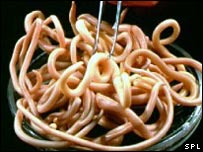
-----------------
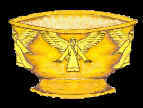
Wormy Food
"And when the dew that lay was gone up, behold, upon the face of the wilderness there lay a small round thing, as small as the hoarfrost, on the ground. And when the children of Israel saw it, they said one to another, It is manna; for they wist not what it was. And Moses said unto them, this is the bread which the Lord hath given you to eat. This is the thing which the Lord hath commanded, Gather of it every man according to his eating, an omer for every man according to the number of your persons; take ye every man for them which are in his tents.
"And the children of Israel did so, and gathered, some more, some less. And when they did mete it with an omer, he that gathered much had nothing over, and he that gathered little had no lack. They gathered every man according to his eating. And Moses said, Let no man leave of it till the morning. Notwithstanding they hearkened not unto Moses; but some of them left of it until the morning, and it bred worms and stank. And Moses was wroth with them. And they gathered it every morning, every man according to his eating, and when the sun waxed hot, it melted.
.jpg?timestamp=1367035354270)
"And it came to pass, that on the sixth day they gathered twice as much bread, two omers for one man. And all the rulers of the congregation came and told Moses. And he said unto them, This is that which the Lord hath said, Tomorrow is the rest of the holy Sabbath unto the Lord. Bake that which ye will bake today, and seethe that ye will seethe; and that which remaineth over, lay up for you, to be kept until the morning. And they laid it up till the morning, as Moses bade, and it did not stink, neither was there any worm therein. And Moses said, Eat that today; for today is a Sabbath unto the Lord. Today ye shall not find it in the field. Six days ye shall gather it; but on the seventh-day, which is the Sabbath, in it there shall be none."
The Lord is no less particular now in regard to his Sabbath than when he gave the foregoing special directions to the children of Israel. He required them to bake that which they would bake, and seethe (that is, boil,) that which they would seethe on the sixth day, preparatory to the rest of the Sabbath. Those who neglect to prepare for the Sabbath on the sixth day, and who cook food upon the Sabbath, violate the fourth commandment, and are transgressors of God's law. All who are really anxious to observe the Sabbath according to the commandment, will not cook any food upon the Sabbath. They will, in the fear of that God who gave his law from Sinai, deny themselves, and eat food prepared upon the sixth day, even if it is not as palatable. God forbade the children of Israel baking and boiling upon the Sabbath. That prohibition should be regarded by every Sabbath-keeper, as a solemn injunction from Jehovah to them. The Lord would guard his people from indulging in gluttony upon the Sabbath, which he has set apart for sacred meditation and worship.
The Sabbath of the Lord is a day of rest from labor, and the diet upon that day should be more simple, and partaken of in less quantities, than upon the six laboring days, because they do not have that exercise upon the Sabbath that they have upon the other days of the week. Many have erred in not practicing self-denial upon the Sabbath. By partaking full meals, as on the six laboring days, their minds are beclouded. They are stupid, and often drowsy. Some suffer with headache. Such have no truly devotional feelings upon the Sabbath, and the blessing resting upon the Sabbath does not prove a blessing to them. The sick and suffering require care and attention upon the Sabbath, as well as upon the other six days of the week. And it may be necessary for their comfort to prepare warm food and drinks upon the Sabbath. In such instances, it is no violation of the fourth commandment to make them as comfortable as possible. The great Lawgiver is a God of compassion as well as of justice.”
3SG 252-254
Worm
“If you should keep some of the tiny eggs that the butterfly lays, and watch them, would you see little baby butterflies with tiny wings come from them, expecting to be fed with honey? No; little insects not at all like their mother,-little grubs or caterpillars,-would crawl out, eat up the shell of the egg, and begin at once to feed greedily upon the leaf where the eggs had been laid. For although the butterfly herself feeds only on honey, and knows nothing about caterpillars and their food, she always lays her eggs in just the place where the little caterpillars will find the very food that they want.
This is very wonderful, for different kinds of caterpillars feed on different plants, some on cabbage leaves, some on the leaves of the nettle, and some on other plants. But the mother never makes a mistake; she always leaves the eggs where the young ones will find the right kind of food ready for them. See how carefully and lovingly she provides for the young ones whom she will never see; for almost as soon as the eggs are laid, the butterfly dies.
How can she have such wisdom and intelligence, you will perhaps wander. But this wisdom belongs not to the butterfly, it belongs to the life that she has, which is not her own, but God's life in her, as it is in all His works, guiding each one in the right way. It is the life which holds the earth in its place and guides it in its path round the sun, that guides it in its path round the sun, that guides each tiny insect in just the works that God has appointed for it.
We have been learning about the plants that they are not perfect at once, but come forth, "first the blade, then the ear, after that the full corn in the ear." And it is just the same with these little insects; there is first the grub or caterpillar, then the chrysalis, and at last the perfect creature,-the butterfly.
The caterpillar is a very hungry little thing, and spends nearly all its life feeding, for it needs a great deal of food to enable it to do the work for which it is getting ready. It grows very fast, and when its coat gets too small, it casts it off and appears in a new and larger one that has been growing underneath.
After living in this way for some weeks or months, the caterpillar builds or spins a little house for itself like a tiny coffin, and wrapping its body in a beautiful silken shroud that it spins for this purpose, it passes into the state of rest called the chrysalis state, in which it eats nothing at all, and shows no sign of life. Some even bury themselves under the ground, but others fasten their little houses to the leaves or twigs of plants.
Those that pass into the chrysalis state in the autumn, stay in this condition all the winter. But when the warm sunshine comes back again, the time of their rest and burial is over, the little prison houses burst open, and out come,-not the old creeping caterpillars, but beautiful soaring butterflies, with large painted wings covered with delicate feathery scales, able to soar like the birds, and as beautiful as the flowers.
What a change! What a wonderful transformation! Think, then, of the glorious possibilities wrapped up in each little creeping caterpillar that you see. When its short life of toil is over, it passes from sight, and there seems to be an end of it. But is it so? Oh, no; when its appointed times comes, it awakes clothed with a more beautiful garment, with new powers, to a new and fuller life.
Is not this a wonderful chapter of the Gospel of the Spring?-the Gospel of Hope, "the hope of glory," we may call it: for this is the message of the Spring season, and through all the ages it has been teaching the same beautiful lesson.”
March 9, 1899 EJW, PTUK 154
A SINGLE WORM KILLED THE TREE.
the summer of 1853, I was staying at Sudbrook Park, near Richmond, in Surrey. One day I was walking with some friends through the "wilderness," when Dr. Ellis drew our attention to a large sycamore tree, decayed to the core.
"That fine tree," said he, "was killed by a single worm."
In answer to our inquiries, we found that about two years previous the tree was as healthy as any in the park, when a wood-worm, about three inches long, was observed to be forcing its way under the bark of the trunk. It then caught the eye of a naturalist who was staying there, and he remarked, "Let that worm alone, and it will kill the tree." This seems very improbable, but it was agreed that the black-headed worm should not be disturbed.
After a time it was discovered that the worm had tunnelled its way a considerable distance under the bark.
The next summer the leaves of the tree dropped off very early, and in the succeeding year it was a dead, rotten thing, and the hole made by the worm might be seen in the very heart of the once noble trunk.
"Ah!" said one who was present,
"let us learn a lesson from that single tree. How many who once promised fair for usefulness in the world and the church have been ruined by a single sin!"